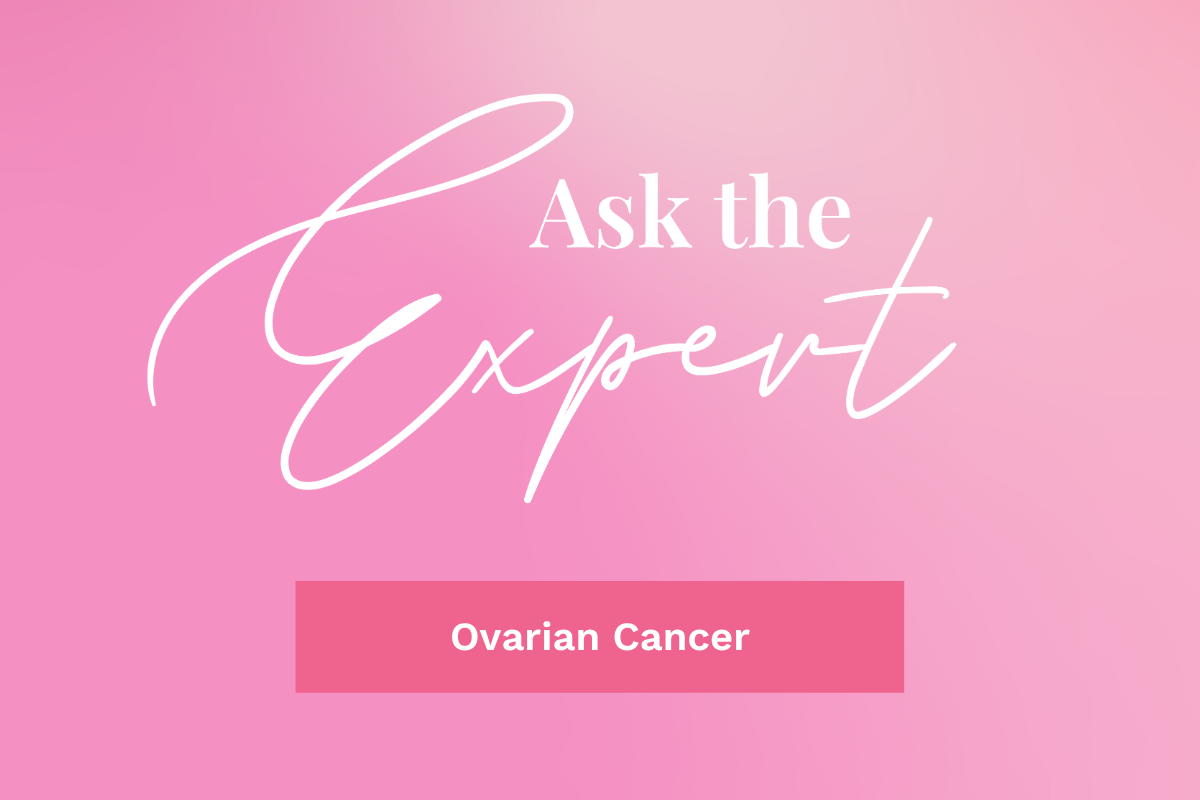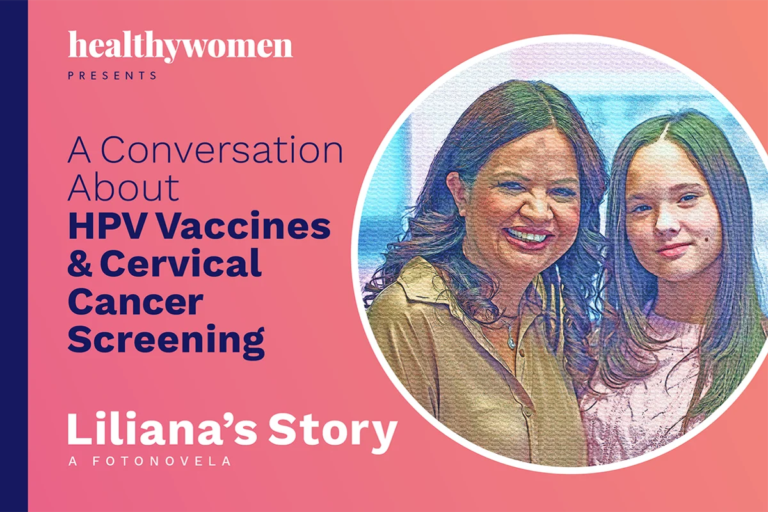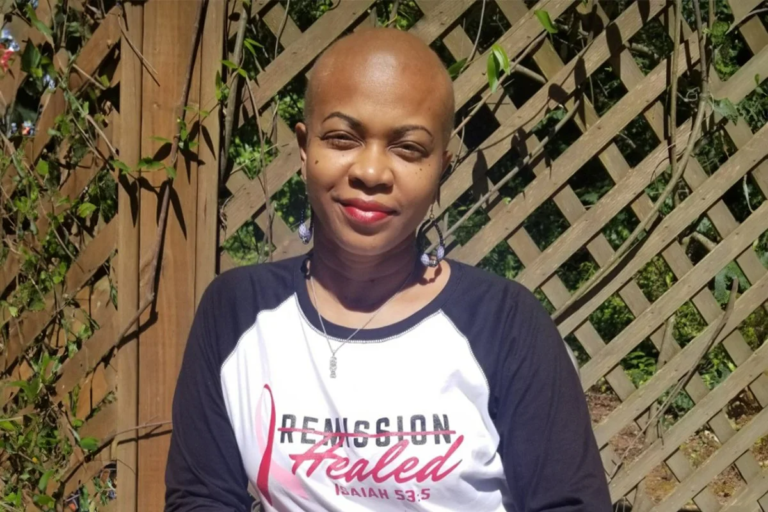This educational resource was created in partnership with Tell Every Amazing Lady and with support from Merck.
Video transcript
Can you tell us about your connection to ovarian cancer and the start of your organization?
So it’s very personal to me. My sister was diagnosed with ovarian cancer in around 2007, and we live in New York City the capital of the world and just thought okay she’s got ovarian cancer diagnosis we’re going to find resources we’re going to find events and a community of people who have ovarian cancer and it was really challenging and we were just shocked by that so it sounds simple now to talk about it but it was a lot but we basically made the resources she was looking for that is the core route to our foundation um Luisa the booster battle years later about almost five years later and she helped us get the foundation started she helped us start what we call the teal walk our ovarian cancer walk has had satellite walks in different cities but one of the main things that we wanted to do is make a lot of noise and tell people about this disease so um the name of our foundation is to Tell Every Amazing Lady and it is the symbol of teal when we heard that the color teal which I’m wearing today is the color from ovarian cancer we came up with an acronym and Tell Every Amazing Lady just stuck so um you know being impacted with a family member having this disease and um not everybody is going to start a foundation but we sort of took a negative and made it a positive and you know we wanted to provide resources for other families like us.
Why is knowing your family history important for ovarian cancer?
You know ovarian cancer is one of those things where most women think when they go for their annual exam if you can even get them there for the annual exam that you know their ovaries were looked at and everything below the belt has been reviewed and you’ve got the all clear from a doctor and that’s very misleading because there is no screening test for ovarian cancer the Pap test does not test for ovarian cancer and I’m going to say that again there is no screening test for ovarian cancer there’s nothing that’s 100 accurate so this is a disease that’s usually caught a late stage it’s quite often missed and it’s misdiagnosed quite a bit so we you know have tools that are at least signs and symptoms and risk factors that we can cover now and it’s definitely something that my foundation advocates for and promotes but even with all that information it’s still really difficult to detect so knowing a family history is pretty important for instance my family history has ovarian cancer in it but we also have colon cancer and esophageal cancer and those pose to be arrested so we decided to get genetic testing done and learn that my family does in fact have a gene and that’s not always the case but it is something that’s really important as a tool that people can have because there is no screening test so the risk factors um you know could be a family history of breast cancer colon cancer or endometrial cancers also important and even uterine cancer any of those cancers are in someone’s family you really should consider genetic testing if you’re worried about ovarian cancer in particular and or any of those cancers really but um but because there’s no screening test the signs and symptoms are also really important um the importance of ovarian cancer is that those signs and symptoms are really vague too so it could be like pelvic pain or abdominal pain or bloating like what women doesn’t maybe get some of these symptoms once a month um back pains also included as well and you know I’ll use an example where my sister had back pain is one of her symptoms and she also had abdominal and pelvic pain but she had an old back injury she had other things like endometriosis and they’re sort of seemed like there was a reason for these symptoms and even the doctors don’t have the tools to detect it so they were sort of blown off and pushed out to the side but she was seeing doctors and saying hey this thing is bothering me so the point is getting back to the family history we knew that there was some family history of other cancers but there was no ovarian cancer in our family so it wasn’t even on our radar and now that we know about genetic testing and later after Her diagnosis got into genetic testing done we realized how important that is to understand that and talk to your family about you know what diseases besides cancer or even in someone’s family you know there’s even a family who has diabetes.
Have you or any of your family members had genetic testing?
Family members did some of them did some of them did it it’s not for everybody it’s a very personal choice and the way that um I had my genetic testing done is when my sister was diagnosed very soon before right when she was starting to get her treatment this was around the time where immunotherapy was sort of Cutting Edge and brand new and her doctors felt if they knew about her genes and had other family members if we know that if there’s a lynching or more bronchopositive in the family they would know how to treat her so we all we heard was this could help her with her treatment and myself and other family members like okay what do we need to do this can help her take my blood or swab or whatever we need to do and it has come a long way where when I was had genetic testing done I didn’t really understand it completely and this is before we started our foundation um and I got a positive result and was really shocked by it I didn’t think this had anything to do with me we were doing this to help my sister with her treatment and so when we learned that myself and other family members have Lynch syndrome we were like what does this even mean what do we do now um so we’re just like everybody else you know learning and walking through this but I will emphasize that genetic testing is not for everyone and what we found and and still to this day is important is to sit down with the genetic counselor first and really talk about it and truly understand if you are positive or negative you know what that impact might be and how that might feel to get those answers and so there is a lot more guidance and help and we are also a resource who can help with that if anybody is interested but it’s you know it’s a personal decision and choice to do that.
What actions did you take after getting your genetic testing results?
When I got this test done um I was still in my 20s I was sort of newly married and was being told you know a week after getting results you need to have a full hysterectomy you need to do all these crazy things that I was like in shock over and just wait a second what are we even talking about here so I think it’s important to recognize that and I didn’t realize that that’s what I was getting myself into but like I said you know I don’t want to create fear for anybody because it was it’s really important to know that and now I feel all of that knowledge and information is was power for me and even though you know a genetic counselor was advising me to do these things it wasn’t that I had to do them immediately or that day or overnight it was that hey wait a second we just learned that you do have a risk a high risk to cancer I have a gene there is no test for ovarian cancer so there’s not a lot we can do about it and I did begin to feel empowered with the inflammation and so the information for me particularly having Lynch syndrome which maybe not a lot of people know but it is an increased risk for a colon cancer ovarian cancer uterine cancer and many others but those are the like higher three um and so it makes sense my sister had Lynch syndrome she had ovarian cancer and I’ve got the same uh syndrome that she does with genetics so there’s you know kind of alarm Bells going off what am I going to do about this so I waited a long period of time many years even more than a decade for me to actually have a full hysterectomy and I only did it when I was ready and it was the right time for me um and it’s a big decision some people may choose to never have a hysterectomy if they’re being told because of their genes and their surveillance that can be done I chose surveillance for a long time and then I felt more comfortable having everything removed there’s other things that are that are advised for me right when I was you know diagnosed with one syndrome I was told never to miss a colonoscopy and it’s interesting that that was told to me I had already been having colonoscopies um I had had you know some symptoms on its own and uh I actually was having enough colonoscopies that I’ve had many polyps removed and one of them was actually really large and had to be surgically removed in a hospital so I’m convinced that a colonoscopy saved my life and I didn’t even know it and now I can associate it and put it together with genetic testing and this is how important this information is because knowledge is power and I won’t miss a colonoscopy and you know those things do save you and and protect you with information the other thing that I’ve done is I have a urologist who you know that’s looking for bladder cancer and checking out you know those types of that organ and those types of scenarios where you know cancer can Wetland syndrome can hit different organs and it’s just important to have these follow-up exams it might sound really complicated but you know if I just have an annual screening with these couple of specialists a gastroenterologists a urologist and gynecologist or OBGYN um I was seeing a gynecologist oncologist because of my risk those three doctors are really important for me not to skip those exams it’s just really important that genetic testing is something that is advised for those families at risk and it can be really powerful as a tool for surveillance and for you know preventative certain you know to prevent these cancers.
What advice would you give women to advocate for themselves when it comes to genetic testing?
You know just going back to knowledge is power when you know any advice about genetic testing I would say you know don’t be afraid and really educate yourself and and try to understand your own family history some people don’t know their family history maybe that’s impossible to have a family history you know for many reasons adoption and um you know people may not be around to talk to anymore so you know this is a link to um your health and something that you can take uh seriously and and make it important and to not miss those doctors appointments but the thing with ovarian cancer is that even um someone who is educated and knows the signs and symptoms and knows the risk factors and goes to the doctor for this particular disease it can still be missed so genetic testing is one of those tests that actually can shed some light on a family who might be at an increased risk and then empower them with some tools that might help protect not just you but think about maybe sisters nieces grandchildren daughters you know we looked at this as something that would help the whole family understand that there is a family risk and a link to this disease.
Is there anything else you would like to add?
I’d love to go back to the signs and symptoms and spend a moment on that where you know ovarian cancer oftentimes has vague symptoms so you know back pain someone might have a previous back injury or um not really think that that could be a symptom of a disease or something there’s bloating, every woman usually has bloating maybe after you eat a plate of nachos or it’s once a month uploading is a pretty common symptom that most women get you know on from time to time abdominal pain pelvic pain sometimes changes in bowel habit habits there could be a feeling of wholeness maybe you just can’t finish a plate of food the way you used to and you find yourself not being able to you know finish a meal or losing weight for no reason or gaining weight for no reason you’re not on a special diet and you know something is fluctuating because these symptoms are kind of vague and you know could mean something else or you know you might have a reason for it it’s really important to just play pay close attention to it and if they last for more than two weeks and they’re not associated with something else it’s still important to question your doctor and say hey you know can you just prove to me that I don’t have ovarian cancer and you know that in a nutshell is is tough because there’s no screening test but it’s still something that should be on your radar and you know using this video is an opportunity to just learn a little bit more about ovarian cancer the takeaways are that the pap smear does not test for ovarian cancer your annual screening test is not looking for ovarian cancer there is no screening test but there are signs and symptoms and then some other risk factors are also a family history of breast cancer which is also associated with ovarian cancer colon cancer of course ovarian cancer sometimes endometrial cancer there also could be someone who’s never been pregnant it actually could increase your risk um but there’s some good news reducing your risk could be someone who might have been on birth control for more than five years that actually lowers the risk which is nice um there’s a lot of studies showing that that’s about a 50 percentile reduced rate and then there are some things that you could ask your doctor for so for instance before I had my hysterectomy I would ask for a CO ca125 test which is a blood test it is not a perfect test to check for ovarian cancer but it does um sort of show some red flags in some individuals but it can completely miss it in others but it’s something where maybe when you’re having your cholesterol checked you might just say hey Doc can you put on a ca125 test on my blood test as well and usually that’s very easy to do I was also having a transvaginal ultrasound which is also part of our guidance that’s something that you can do or request from your OBGYN and there’s also a vaginal pelvic rectal exam that your OBGYN can also do so those three tests are something that can also maybe catch this a little bit sooner or catch a red flag even though there is no test so those are some of the tools that would be really helpful for this disease.















